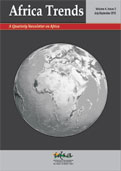Nigeria’s Naval Power – Reviving capacity after prolonged decline
The Nigerian Navy is slowly clawing its way back to being a viable force capable of performing critical missions in respect of EEZ surveillance and patrol. It possesses an adequate fleet of inshore and riverine patrol craft and its growing refit and overhaul capabilities should prove adequate to the task of maintaining these vessels and augmenting them with new construction. However, the Nigerian Navy continues to face capability gaps in respect of the number of major surface combatants as well as the weapons systems available to the fleet.
- Sanjay Badri-Maharaj |
- July-December 2018 |
- Africa Trends





